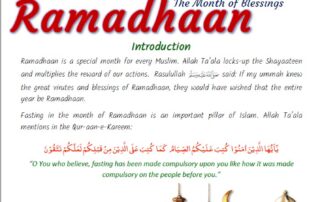The Mubaarak Month of Ramadhaan
Muhtaram Ulama / Muallimaat
Assalaamu alaykum wa rahmatullahi wa barakaatuhu
In order to create an environment of Ramadhaan in our maktabs, we should try and encourage the children to fast, perform Taraaweeh, make tilaawat of the Qur-aan Shareef and zikrullah daily. In order to encourage them we have attached some activities for the children which may asisst them to uphold this pillar of Islam.
Please find attached….
- Al-Maktab Newsletter (Topic: The Month of Ramadhaan)
- Ramadhaan Fasting chart (For Grade R,1 and 2 learners)
- Maamoolaat form for senior students (Grade 3 upwards)
- Chart of 70 000 Kalimah Tayyibah
- Chart of 100 000 Istighfaar
Please print these attachments and hand them out to the pupils before Ramadhaan. Discuss each chart with the pupils and show them how to fill it in.
Also encourage the pupils in Grade 5,6 and 7 to try and complete one khatam of the Qur-aan Shareef during Ramadhaan.
May Allah Ta’ala bless us all with an accepted Ramadhaan and give us all the taufeeq (ability) to spend our time correctly in the ibaadat of Allah Ta’ala during this blessed month.









